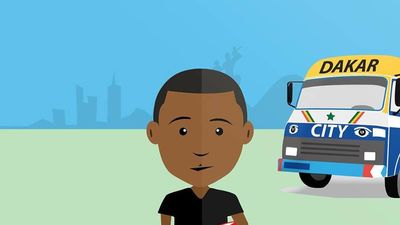Inside Senegal's Most Addictive New Video Game
'Cross Dakar City' creator Ousseynou Khadim Beye on the tech scene in Dakar and what it takes to be a Senegalese video game designer
Twice now I’ve been so engrossed in "Cross Dakar City" that I’ve missed my subway stop. It’s a deceptively simple game for a smartphone, an updated Frogger framed as the story of a young beggar, Mamadou, trying to cross Dakar to look for his biological parents. He has to avoid road traffic, rivers, trains and bombs to get where he’s going.
We talked to Ousseynou Khadim Beye, the developer behind the game, to find out more about the tech scene in Dakar and what it takes to be a Senegalese video game designer.
Growing up in Dakar, Beye was an avid gamer who kept a critical eye on what he was playing. “I always wanted to develop my own video game” says Beye. He studied computing at the Ecole Supérieure Polytechnique Dakar before going on exchange to Lyon in France and getting an internship at Ubisoft, the French company behind hit games like Assassin's Creed and Just Dance. It was at Ubisoft that he discovered how to apply his training.
One of the major barriers to creating more app developers in Senegal, says Beye, is the way computing is taught in schools. In Senegal, he says, there’s a lot of emphasis on learning programming languages without any instruction on how to connect it to the real world.
“People should be more oriented to resolving solutions than just learning programming languages,” he says. “Learning languages without applying them is not useful.”
The other barrier is money. Beye developed "Cross Dakar City" at nights and on weekends between shifts at his day job: a software project manager in the French energy sector. Other Senegalese developers don’t have that luxury he says. For tech to thrive in Senegal, says Beye, there needs to be facilities where people can do their work: “Having coworking spaces and incubators to help young entrepreneurs could help. [Developers] need to know they can satisfy their basic needs while working on projects that they love.”
- Cross Dakar City's creator, Ousseynou Khadim Beye
The positive reaction has come as a surprise to Beye. He was expecting a backlash. “I was thinking maybe people would say, ‘in Africa we don’t need video games when primary needs aren’t being met.’” Instead he’s had great reviews and plenty of local attention.
He hopes this acclaim can bring attention to the 15,000 child beggars, the talibés, who roam the streets raising money for their marabouts, Islamic leaders ostensibly meant to be educating them but more often than not, exploiting them to make money.
“People are not doing anything to help them” says Beye. “For most Senegalese, they are part of the decor.”
He’s already partnered with a local organization that tries to place the children in regular schools. They’re using "Cross Dakar City" to educate the children on the dangers of automobile traffic. He’d like to expand his reach by partnering with organizations like UNICEF, Plan or Human Rights Watch to create more opportunities for talibés. “It’s not a matter that one or ten people could resolve,” he says. Beye believes that to solve the problem of child beggars, he needs to create a broad coalition of NGOs and government to solve it and bring hope to these young beggars. “If they don’t have education then they do not have hope for the future,” he says.
"Cross Dakar City" is available for download on Google Play, Apple and Windows. Keep up with the game on Facebook.
